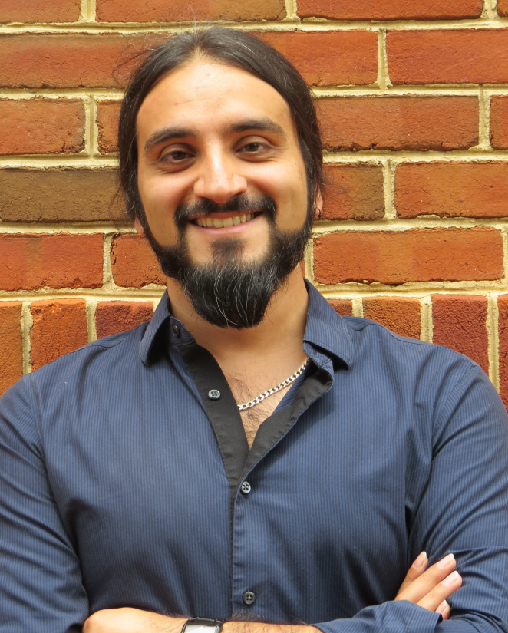
Babadi, Behtash
Associate Chair for Graduate Studies
The Institute for Systems Research
Brain and Behavior Institute
Maryland Applied Graduate Engineering
Behtash Babadi received the Ph.D. and M.Sc. degrees in Engineering Sciences from Harvard University in 2011 and 2008, respectively, and the B.Sc. degree in Electrical Engineering from Sharif University of Technology, Tehran, Iran in 2006. From 2011 to 2014, he was a post-doctoral fellow at the Department of Brain and Cognitive Sciences at Massachusetts Institute of Technology as well as at the Department of Anesthesia, Critical Care and Pain Medicine at Massachusetts General Hospital. His research interests include statistical and adaptive signal processing, neural signal processing, and systems neuroscience.
Education
Ph.D. in Engineering Sciences, Harvard University, 2011
M.Sc. in Engineering Sciences, Harvard University, 2008
B.Sc. in Electrical Engineering, Sharif University of Technology, Tehran, Iran, 2006
Honors and awards
E. Robert Kent Teaching Award for Junior Faculty (2019)
NSF Faculty Early Career Development (CAREER) Award (2016)
GSAS Merit Fellowship, Harvard University (2010)
Statistical and adaptive signal processing, neural signal processing, machine learning, systems neuroscience
- S. Mukherjee, B. Babadi, and S. A. Shamma, Sparse high-dimensional decomposition of non-primary auditory cortical receptive fields, PLoS Computational Biology, Vol. 21, No. 1, e1012721, 2025.
- S. Mukherjee and B. Babadi, Adaptive modeling and inference of higher-order coordination in neuronal assemblies: a dynamic greedy estimation approach, PLoS Computational Biology, Vol. 20, No. 5, e1011605, 2024.
- P. Das and B. Babadi, Non-Asymptotic Guarantees for Reliable Identification of Granger Causality via the LASSO, IEEE Trans. on Information Theory, Vol. 69, No. 11, pp. 7439–7460, 2023.
- B. Soleimani, P. Das, I.M. D. Karunathilake, S. E. Kuchinsky, J. Z. Simon, and B. Babadi, NLGC: Network Localized Granger Causality with Application to MEG Directional Functional Connectivity Analysis, NeuroImage, Vol. 260, 119496, 2022.
- A. Rupasinghe, N. Francis, J. Liu, Z. Bowen, P. O. Kanold, and B. Babadi, Direct Extraction of Signal and Noise Correlations from Two-Photon Calcium Imaging of Ensemble Neuronal Activity, eLife, 10:e68046, 2021.
- A. Rupasinghe and B. Babadi, Multitaper Analysis of Semi-Stationary Spectra from Multivariate Neuronal Spiking Observations, IEEE Trans. on Signal Processing, Vol. 68, pp. 4382–4396, 2020.
- J. Liu, M. R. Whiteway, A. Sheikhattar, D. A. Butts, B. Babadi, and P. O. Kanold, Parallel Processing of Sound Dynamics across Mouse Auditory Cortex via Spatially Patterned Thalamic Inputs and Distinct Areal Intracortical Circuits, Cell Reports, Vol. 27, No. 3, pp. 872–885.E7, 2019.
- A. Sheikhattar, S. Miran, J. Liu, J. B. Fritz, S. A. Shamma, P. O. Kanold, and B. Babadi, Extracting Neuronal Functional Network Dynamics via Adaptive Granger Causality Analysis, Proceedings of the National Academy of Sciences, Vol. 115, No. 17, E3869-E3878, 2018.
- S. Akram, J. Z. Simon, and B. Babadi, Dynamic Estimation of the Auditory Temporal Response Function from MEG in Competing-Speaker Environments, IEEE Trans. on Biomedical Engineering, Vol. 64, No. 8, pp. 1896-1905, 2017.
- S. Akram, A. Presacco, J. Z. Simon, S. A. Shamma, and B. Babadi, Robust Decoding of Selective Auditory Attention from MEG in a Competing-Speaker Environment via State-Space Modeling, NeuroImage, Vol. 124, Part A, pp. 906—917, 2016.